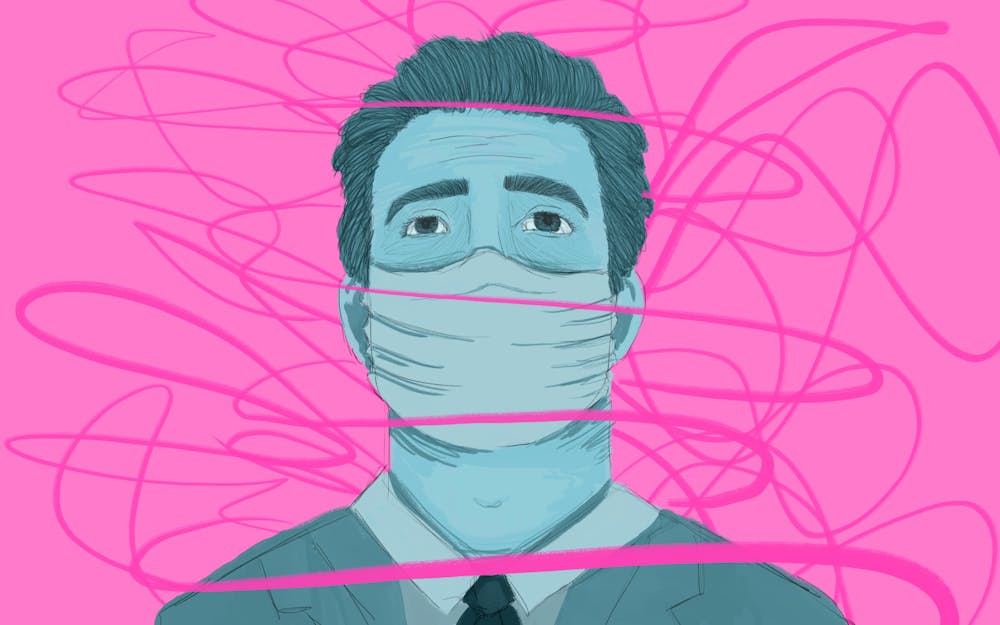I stopped caring about being perceived as “traditionally masculine” a long time ago.
I think the first time this concept came up was at my first job when, to the surprise of everyone I worked with, I nonchalantly mentioned the fact I was straight. It bothered me for a little bit — the fact I was seen as being “gay” or “feminine” or whatever adjective my insecure 16-year-old self came up with — but I quickly got over it and realized that it really doesn’t matter.
It doesn’t matter because gender is a social construct, a blurry system of norms and values and traits we’ve, over the years, come to associate with particular sexes.
Men are supposed to be strong and stoic and they’re not allowed to care about fashion or to paint their nails or even to hold their textbooks a certain way.
Women, on the other hand, are homemakers, sweet and caring and, frankly, a bit irrational because of it; she cares more about shopping than what’s going on in the news and don’t even get her started on shoes.
Together, these two imaginary people make a perfect ‘50s nuclear family — just add a kid who’ll be raised with the exact same values to continue the cycle, and you have the reason why the gender binary myth exists to this day.
It’s worth making clear from the start that masculinity or femininity aren’t inherently bad things: it’s okay to be a masculine man and it’s okay to be a feminine woman. I do think those go without saying, but I know if I don’t clarify that now then at least one person will think it’s my stated goal to make men more feminine or whatever.
No, the concept I criticize today isn’t masculinity in an abstract, undefinable sense, but toxic masculinity, a concept that’s easily pinpointable and perpetuates actual, serious societal harm.
Despite its reputation as a woke buzzword created by vegetarians who find John Wayne films offensive, toxic masculinity hurts everyone, regardless of gender identity. It’s a patriarchal prison that serves to not only dominate women and other marginalized groups but also men themselves.
[Related: OPINION: No one likes a mad woman]
It’s everything self-proclaimed men’s rights activists should be fighting against, if only they weren’t perpetually immortalizing it.
I’m reminded of the Gillette commercial criticizing toxic masculinity that aired in 2019. Don’t get me wrong, I will never be one to praise a corporation for producing a video that jumps on the bandwagon of a popular social issue — nevertheless, it is interesting to note the severe backlash the video received from men who believed it was criticizing their existence.
And that’s the problem I’ve been getting at: to criticize toxic masculinity is, in the eyes of society, to criticize men themselves. So ubiquitous are the concepts that men can’t express emotions, that men must be strong and use violence when necessary and that “boys will be boys,” that to apply a label to them is equivalent to some societal scheme to kill masculinity entirely.
Not only that, but it’s standard practice to assume that any man that doesn’t fall into these rigid boundaries is gay, an assumption that’s, in itself, homophobic. Before I really cared what people thought my sexuality was, I was told it was the way I dressed, the way I talked, the things I was interested in, the way I wouldn’t talk about women’s bodies or, my personal favorite, the “way I carried myself.”
It was any number of things, most of which I couldn’t control. And it was an impossible battle to win, so I stopped trying.
There are plenty of men who don’t, though. They continue to try and win the battle and appear as “masculine” as possible. A 2021 survey from stem4, an organization promoting mental health awareness among teenagers, found that around 46% of men and boys experiencing a mental health issue wouldn’t ask for help, with 14% of them stating it would make them “feel less masculine.”
That’s an existential systemic issue. There is no excuse for the society we’ve created wherein men are expected to suck it up and deal with their own mental health issues — no wonder nearly 80% of suicide victims in the United States are men.
[Related: OPINION: Transphobia hurts us all]
Ultimately, toxic masculinity is an issue that only men can fix. Men must hold other men accountable for their behavior. Men must help raise the next generation of men to reject the traditional values that barricade their personal growth. And men must create a culture of acceptance and understanding among other men, building each other up and being there for each other rather than making their lives hell.
It’s okay for a man to define masculinity however they feel comfortable doing so. It’s okay for a man to reject masculinity entirely and embrace an alternative form of expression. It’s okay, and integral, for masculinity to be inclusive and encompass gay and trans men as well. And it’s okay for men to ask for help, because God knows we’ve created a system where they need it.
There is no glory in suffering, and it doesn’t make you any less of a man for admitting so.
Joey Sills (he/him) is a junior studying journalism, political science and film production.




